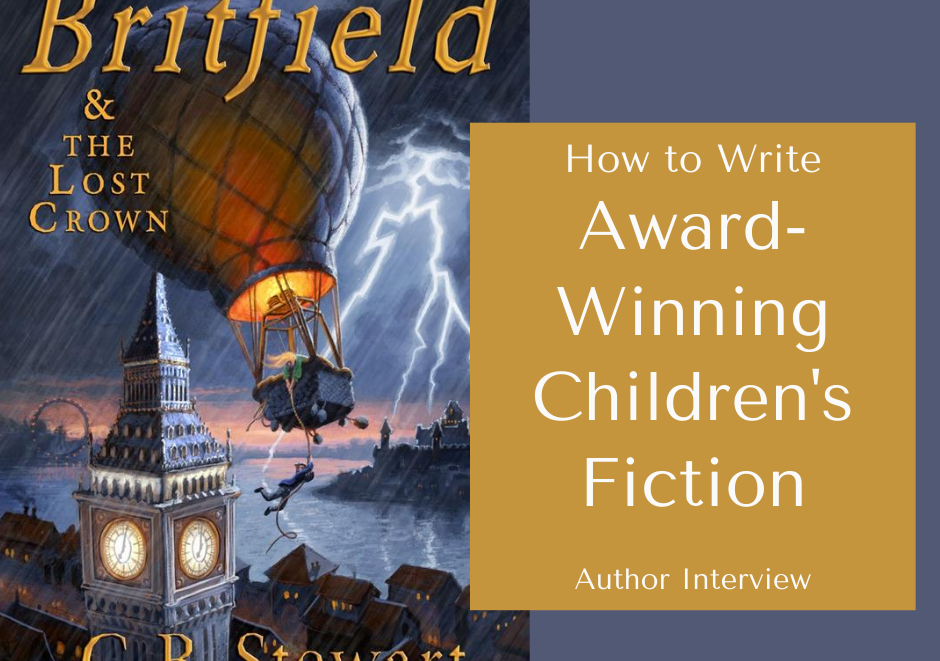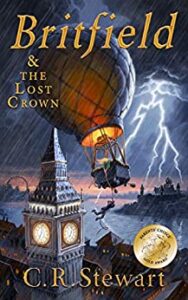
Writing award-winning literature is both art and science. It takes a tremendous amount of talent, skill, research, and dedication. As part of our commitment to recognizing literary excellence, the San Diego Book Awards Association is proud to publish a series of seven author interviews conducted to demystify what it takes to be the best in your genre.
We are excited to launch the series with an interview of C.R. Stewart, winner of the 2020 San Diego Book Award in Children’s Fiction.

C.R. Stewart shared his knowledge and expertise in writing award-winning children’s fiction during an interview with the San Diego Book Awards Association.
Inspired by a Sketch
SDBAA: What inspired you to write this award-winning children’s book?
Stewart: Over ten years ago, it started as a sketch I did of a hot air balloon with a young boy and girl trapped inside. From this simple drawing sprang the entire concept and story for Britfield & the Lost Crown.
I also liked the idea of adventure, exploration and freedom—seeing an extraordinary country for the first time: moving from place to place, enjoying spectacular scenery and exciting events, learning new things, meeting people, making friends, and having hope for a better future.
I like that not everything is what it seems. Not everyone is who you think they are: the simple often can become great, the great often turn out to be simple.
The story takes place in England, modern times. I have always loved Britain, lived in England for years, and was a British literature major at Brown University. Therefore, I enjoyed sharing some of my own experiences in my fictional novel.
How to Outline Your Story
SDBAA: For the aspiring author yearning to write excellent children’s fiction, can you share your writing process?
Stewart: It is extremely important to first outline your story.
We are often eager to just start writing, which on one level is great—sit down and start putting your ideas to paper (or computer). However, you really need to spend the time to brainstorm your entire story. This is a hard process.
First, what is your story about, where does it take place, what is the duration and what is the main theme (there will be other themes)? What is the beginning? Knowing you should always start on the action (not some long, boring introduction).
What is the end? It is important to know how your story will end, even though it may change through the writing process. You need to know where you are driving the narrative and how it will conclude.
I always formulate my beginning and the end. Next, I follow a script-like outline of Plot Point IA, Plot Point IB, Midpoint, Plot Point IIA, and Plot Point IIB. What will be the major moments in your story, the turn-of-events, the revelations, the reversals?
Then I start outlining my story, scene by scene: these are simple bullet points with a few details. Once you start writing it, starting at the beginning, and filling it all in, it is a fluid process, because you know what comes next and where the entire narrative is going. It is similar to designing architectural plans for a house; once they are completed, you build.
Excellence Requires Extensive Editing
SDBAA: What was the hardest part of writing Britfield and the Lost Crown, and how did you overcome it?
Stewart: For Britfield & the Lost Crown, it was the long process.
Often, we live with the concept that you write your story (first draft) and then all you need is a little editing and corrections. Your first draft is simply the beginning of a long process.
Once I completed the first draft, I came back a do another edit, which takes months. I would finish it and thought it was perfect. Then I would take a break and start again, catching all types of mistakes, repeated words, and awkward sentences or paragraphs.
I had no idea how long it would take to write Britfield, not months but years. Nevertheless, I was committed to producing the best story I could, a fast-paced adventure novel that children and adults would love to read.
How to Stay Productive
SDBAA: One of the biggest challenges for aspiring authors is to finish writing their first draft. What do you do to stay productive and focused?
Stewart: Don’t worry about your first draft; just get your ideas and words onto paper (or the computer). Challenge yourself each day to produce a certain amount, perhaps two or three new pages. If you’re stuck on the next chapter, but you know what happens in another section, then jump to that scene. Just keep writing.
If you can’t think of anything new, then start editing what you’ve already written, but just keep writing.
This is the discipline and commitment needed to finish a book. However, it’s one thing to create your story, structure, characters, and a compelling narrative; it’s another to edit.
They say that writing is 10% and editing is 90%. I find this relatively accurate. The more you edit, the better your story becomes; the more you edit, the more polished your writing becomes. Nevertheless, there is a time when you must finish and let it go, so you can move onto your next story.
Most importantly, have fun. Write because you enjoy it
How to Craft Your Story
SDBAA: What is the best advice you can give fellow current and aspiring authors about writing an excellent book in your genre?
Stewart: Always write about what you know and what you love—this will make your story fun and unique.
Story is everything. It can be simple or complex, but it must be interesting and well-told. Find a unique story and start writing.
First create your structure: beginning, middle, and end. It’s easier when you think about the story in chapters: where’s the book going, what happens next and how will it end?
Develop your characters and know them well—give them depth and obstacles that they must overcome. Do your research and master the subject you’re writing about.
Also, read. Enjoy reading and understand what’s out in the market. Find writers you like and learn from them: how they tell a story, the way they structure or pace their narrative, how they describe things. Analyze these books and figure out what makes them interesting or compelling—why they’re successful or why they work as a novel. You never want to copy a style or another writer, but it’s essential to study the literary world you want to enter.
If I were a painter, I would study other painters. If I were a composer, I would study other composers. It’s very important to develop your own style and what makes you unique, but this will come with time and experience.
Closing Thoughts
Remember, nothing happens overnight. It takes commitment, discipline, and endurance to produce an engaging and inspiring novel. To write and finish a book, you must first begin and spend time with it.
About C.R. Stewart
Originally from Newport Beach, California, C. R. Stewart has twenty years of experience writing fiction, nonfiction, and movie screenplays. His areas of expertise also include film and media production, global strategy, and international marketing.
C.R. Stewart received a Bachelor of Arts in British Literature and European History from Brown University; did post-graduate work at Harvard University; earned an MBA from Boston College; and is pursuing a Master of Science in Advanced Management and a Ph.D. in Strategy.
Now based in San Diego, C.R. Stewart is dedicated to sharing his passion, the importance of creativity, with educators and students all over the world! https://www.Britfield.com
About Britfield and the Lost Crown
Tom has spent most of his life locked behind the cruel walls of Weatherly Orphanage, but when he learns that his parents might be alive, Tom knows he must do what he can to find them. He can’t leave Weatherly without his best friend Sarah, so armed with a single clue to his past, the word BRITFIELD, the two make a daring escape by commandeering a hot air balloon. Now they’re on the run from a famous Scotland Yard detective and what looks like half the police officers in England. Tom and Sarah’s journey takes them from Oxford to Windsor Castle, through London, and finally to Canterbury. Along the way, they discover that Tom may be the true heir to the British throne, but even with the help of two brilliant professors, it looks like Tom and Sarah will be captured and sent back to the orphanage before they have a chance to solve Tom’s royal mystery.
About the San Diego Book Awards Association
The San Diego Book Awards Association supports and recognizes published and unpublished authors with our annual competition.
Join the 2021 San Diego Book Awards!
The submissions window for the 2021 San Diego Book Awards competition is from 10/1/20 to 12/31/20. For more information, please visit our submissions page.
If you are interested in participating as a judge, please visit our judging page.
![]()

